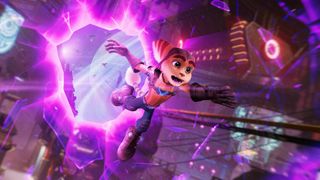Ratchet and Clank: Rift Apart's PC release proves it actually needed the PS5's SSD
Rift Apart running on an actual PS4 hard drive looks like a nightmare

Ratchet and Clank: Rift Apart is now available on PC, which means that developer Insomniac's claims that the game was only possible with the power of the PS5's SSD are being put to the test. Turns out that the developers were right.
Back in 2020, ahead of the launch of both the game and the PS5 itself, creative director Marcus Smith said that "Ratchet and Clank: Rift Apart is a game that utilizes dimensions and dimensional rifts, and that would not have been possible without the solid state drive of the PlayStation 5." That statement has proven weirdly controversial among console warriors over the years, though it's always been clear enough that the quote was referring more to the type of SSD the PS5 uses than some special property of the console itself.
Digital Foundry's John Linneman provided a clip of the PC version of Rift Apart running on a minimum-spec machine equipped with an original PS4 hard drive, and the results are predictably disastrous. In the game's breakneck opening sequence, where you instantaneously travel through a series of portals to other worlds, just getting through a single portal queues up a loading time over a minute long.
Our first look at Ratchet on PC! It has a few issues but it's overall in good shape! Infinitely better than TLOUP1 and Jedi Survivor at launch. The funniest bit is when Rich tried running the game off an actual PS4 hard drive on a machine just above min spec! https://t.co/Qt0qkYwzeu pic.twitter.com/hgFrXKVGSGJuly 26, 2023
Linneman notes that Rift Apart is somewhat more playable on a faster hard drive in a higher-spec PC, but it's still not a match for a proper, modern SSD. I guess that technically means Rift Apart is "possible" without a PS5-grade SSD, but I'm not sure I'd categorize that clip as appearing at all playable. One dev from Insomniac couldn't resist a little "as we said" jab with these results.
The PC release of Rift Apart has had its own weirdo-driven controversy, with some suggesting that its existence is a betrayal of that original quote. Folks, again, that quote is about SSDs - but for what it's worth, the PS5 version of the game still loads marginally faster than even a high-end PC equipped with a top shelf SSD.
Early testing from Digital Foundry suggests that the game isn't taking full advantage of the highest-end PC SSDs in general, and that there are a few stability issues and missing graphical features that are preventing this from being a perfect port. It's still substantially better than the launch version of The Last of Us Part 1 on PC and much more in line with Sony's better-regarded PC releases.
Don't miss any of the best PC games.
Sign up to the GamesRadar+ Newsletter
Weekly digests, tales from the communities you love, and more

Dustin Bailey joined the GamesRadar team as a Staff Writer in May 2022, and is currently based in Missouri. He's been covering games (with occasional dalliances in the worlds of anime and pro wrestling) since 2015, first as a freelancer, then as a news writer at PCGamesN for nearly five years. His love for games was sparked somewhere between Metal Gear Solid 2 and Knights of the Old Republic, and these days you can usually find him splitting his entertainment time between retro gaming, the latest big action-adventure title, or a long haul in American Truck Simulator.
Most Popular





